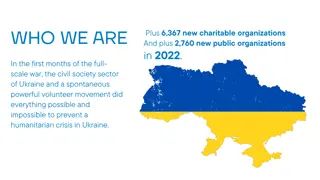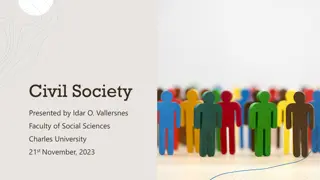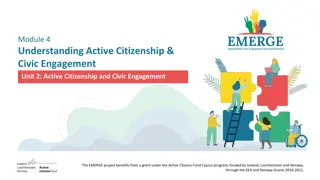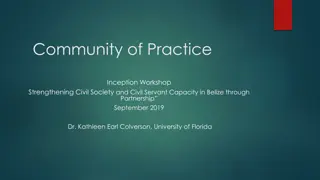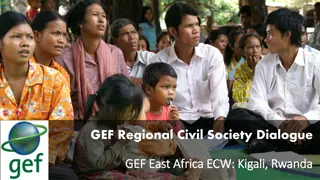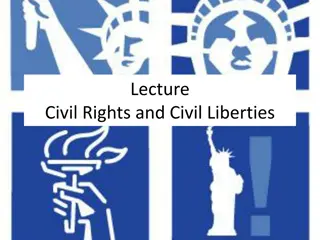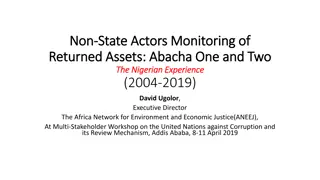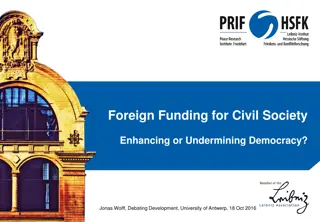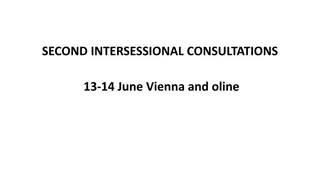Civil Society: What It Encompasses
Civil society is a space of voluntary collective actions separate from the state and market, comprising diverse organizations and individuals working towards shared interests. Various perspectives from institutions like the United Nations Development Program, London School of Economics, John Keane, and Johns Hopkins University Center for Civil Society Studies shed light on the multifaceted nature of civil society and its importance in society.
Download Presentation

Please find below an Image/Link to download the presentation.
The content on the website is provided AS IS for your information and personal use only. It may not be sold, licensed, or shared on other websites without obtaining consent from the author.If you encounter any issues during the download, it is possible that the publisher has removed the file from their server.
You are allowed to download the files provided on this website for personal or commercial use, subject to the condition that they are used lawfully. All files are the property of their respective owners.
The content on the website is provided AS IS for your information and personal use only. It may not be sold, licensed, or shared on other websites without obtaining consent from the author.
E N D
Presentation Transcript
UNITED NATIONS DEVELOPMENT PROGRAM Civil society is an arena of voluntary collective actions around shared interests, purposes and values distinct from families, state and profit seeking institutions. The term civil society includes the full range of formal and informal organizations that are outside the state and the market including social movements, volunteer involving organizations, mass-based membership organizations, faith-based groups, NGOs, and community- based organizations, as well as communities and citizens acting individually and collectively.
WHAT IS CIVIL SOCIETY?, LONDON SCHOOL OF ECONOMICS Civil society is the arena of uncoerced collective action around shared interests, purposes and values. In theory, its institutional forms are distinct from those of the state, family and market, though in practice, the boundaries between state, civil society, family and market are often complex, blurred and negotiated. Civil society commonly embraces a diversity of spaces, actors and institutional forms, varying in their degree of formality, autonomy and power.
CIVIL SOCIETY: DEFINITIONS AND APPROACHES , JOHN KEANE Civil society is a realm of social life market exchanges, charitable groups, clubs and voluntary associations, independent churches and publishing houses institutionally separated from territorial state institutions.
ASSESSING THE STATE OF CIVIL SOCIETY: A TOOLKIT FOR THE CIVICUS CIVIL SOCIETY INDEX (CSI) CIVICUS Civil society is the arena outside of the family, the state, and the market which is created by individual and collective actions, organizations and institutions to advance shared interests.
JOHNS HOPKINS UNIVERSITY CENTER FOR CIVIL SOCIETY STUDIES A civil society organization is an entity that is: Organized, i.e., institutionalized to some extent. Private, i.e., institutionally separate from government. Non-profit-distributing, i.e., not returning profits generated to their owners or directors. Self-governing, i.e., equipped to control their own activities. Voluntary, i.e., involving some meaningful degree of voluntary participation.
THE KENYAN CSO STANDARDS Civil society organizations: Are driven by values that reflect a desire to improve lives; Contain elements of voluntarism (i.e. free choice of association, voluntary contributions of time and money); Have private and independent governance; Are not for profit (i.e. do not distribute profit to staff and/or shareholders); Have clearly stated and defined public purposes for which they are accountable; Are formally constituted under the law and have an accepted identity in line with the culture and traditions prevailing in the country.
WHAT CONDITIONS ARE NECESSARY FOR A HEALTHY CIVIL SOCIETY?
HOW DOES CIVIL SOCIETY IMPACT DEMOCRACY?
PLURALISM Many organizations Freedom to join and lobby Compete to win influence or access to government Represent wide range of population
PATRON-CLIENTISM Focus on leader-follower in favor exchange system Indicative of corrupt regimes (bribes) Rarely insist on legal separation laws Conflict of interest rules Open, competitive contracts Anti-nepotism laws Usually imbedded in culture
CORPORATISM State supports movements (directly or indirectly) Businesses support movements (directly or indirectly) State involved in governance/approval of actions
CHINA CORPORATISM & PATRON-CLIENTISM China used to be way more pluralist than it is now. 2012 over a million NGOs (many not registered) since then there has been a rapid decrease in NGOs and the freedom they have from the government Government consolidating power in the name of streamlining for efficiency Severe crack down on NGOs especially related to human rights Citizenship score is incorporating civil society participation (right v wrong NGOs) Foreign NGOs are under public safety lots of laws to make NGOs in China difficult Rule by law They follow the law so word by word they passed the charity law that look like more transparency, but really more government control Chinese government tells NGOs what to do they are Gos Bottom-up civil society doesn t exist top down machinations stunted growth of civil society Lots of focus on CCP approval and leader
GREAT BRITAIN PLURALISM There are a lot of charities, unions, trusts, etc. (millions of members) Known for human rights and discourse on rights Lots of charities and rights-autism etc. Free to join Many unique perspectives represented (youth, educators, women s groups) Passed lobbying act charities have to register if they spend certain amount influencing voters before elections Pretty clear pluralism .
NIGERIA PLURALISM WITH SOME CORPORATISM-ISH MOVEMENT Current bill to restrict NGO freedom (being protested etc) Would require registration with government Would allow government to deny registration (ie. No anti-corruption NGOs) Would require government approval of certain activities Would have to report all finances to government Biggest organization of NGOs network of Nigerian NGOs (2400) to promote cooperation and government recognition NGOs protected and listed in 1999 constitution Nigerian Labor Congress protects worker and citizens rights (another big org) Network of NGOs does a lot to help with poverty relief in Nigeria (take up slack from government) A lot of the CSOs are being used as bridge between government and people (linkage institutions)
IRAN CORPORATISM/PLURALISM/NON- EXISTENT AT ALL Some approved NGOs allowed, ie. Islamic charities About 5-8000 NGOs total, mostly non-approved Only approved NGOs (of government aligned NGOs) can do anything (non- approved hope for online presence and awareness and hope not to get caught) No workers unions allowed Freedom of assembly allowed but impeded by state-sponsored terrorist group (Basij, Ansar-i-Hezbollah) No foreign NGOs Not much hope for any change at all .
RUSSIA PATRON-CLIENTISM/CORPORATISM* Putin shifting toward corporatism No foreign NGOs (all spies?) Government directly funds all largest NGOs 450,000 approved NGOs Some unapproved Approval based on willingness to cooperate with government (support government agenda) People s donations to NGOs go through government (give government control of money and ability to cut off funding) Russian political culture does not support NGO/civil society participation Civil society almost another branch of government
MEXICO PLURALISM Reg underpromoted Authorized donees Tax exemption and deductions as an incentive Requirements assets used for public benefit, and other regs of income tax act Obrador looking to cut government funding for NGOs Law for the identification of operating with resources? 40,000 (50s 9,000) authorized NGOs growing Over 6,155 $ must identify funds Over 12,310 $ must report to financing intelligence unit Change from 1990s . Many, many more NGOs (quadrupled since mid-nineties) Change from patron-client
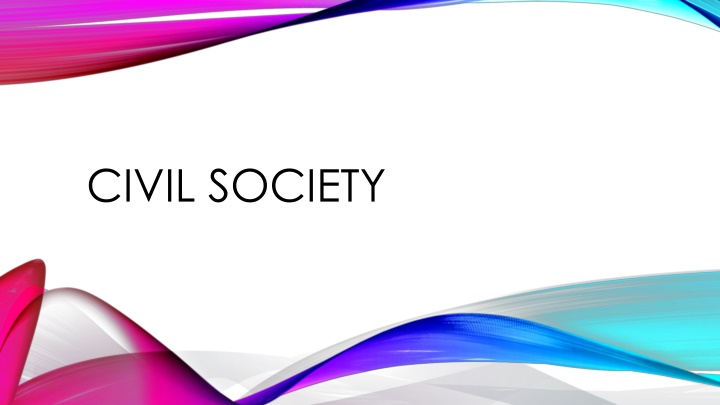

![❤[PDF]⚡ Civil War Talks: Further Reminiscences of George S. Bernard and His Fel](/thumb/20551/pdf-civil-war-talks-further-reminiscences-of-george-s-bernard-and-his-fel.jpg)
